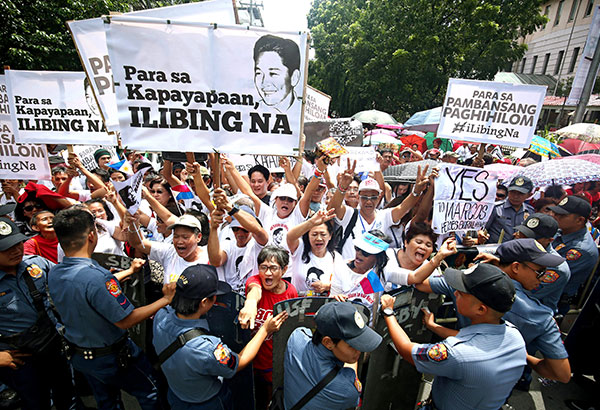Marcos lost entitlement to Libingan burial – Carpio
MANILA, Philippines – When the late strongman Ferdinand Marcos was ousted in the 1986 people power revolt, he was dishonorably discharged as commander-in-chief of the Armed Forces of the Philippines (AFP) and therefore lost his right to be buried at the Libingan ng mga Bayani.
Senior Associate Justice Antonio Carpio made this point during oral arguments at the Supreme Court yesterday on six petitions questioning the decision of the Duterte administration allowing the interment of the dictator at the heroes’ cemetery in Taguig City.
The oral arguments centered on the issue of whether or not Marcos was a hero worthy of interment at the Libingan.
“President Marcos was dishonorably separated from the people in 1986... When president Marcos was ousted, he was removed as a president and was also removed as commander-in-chief,” Carpio stressed during interpellation of former Bayan Muna Rep. Neri Colmenares, one of the petitioners.
Citing AFP regulations covering the interment, Carpio said Marcos may have forfeited his entitlement to be buried at the heroes’ cemetery, which is considered a national shrine by the National Historical Commission.

The AFP interment policy grants space for soldiers, presidents and other dignitaries, but it also prohibits interment of those who were “dishonorably separated or reverted or discharged from service” and on the grounds of moral turpitude.
Carpio pointed out that the people power revolt was a “sovereign act of the people” which, he explained, was higher than the “act of a military tribunal or civilian administrative tribunal.”
“The revolution was a successful revolution. Acts of rebels in removing the head of state is legitimate, valid, final and binding,” he stressed.
Carpio also stressed that the use of the heroes’ cemetery under the law should only be for public purposes and for the people’s “general welfare.”
“But if a person has been dishonorably discharged from service and you bury him there in a government property, that is for a private purpose, to extol honor for the family or the person, not for the public. There is no public good there,” he explained.
Associate Justices Teresita Leonardo-de Castro and Jose Perez admitted that the issue of whether or not Marcos was a hero worthy of interment at the heroes’ cemetery would be hard for the high court to resolve.
“A lot of controversy arises from the term ‘Libingan ng mga Bayani’ when not all buried there are heroes. Who decides who is a bayani (hero)?” De Castro asked.
The magistrate stressed that there is actually “no system of determination who are heroes and who are not.”
She then put on the petitioners the burden to prove that only heroes must be buried at the national shrine when its basic purpose is to honor “those who served the country in war and in peace time.”
Perez agreed with this point, saying “there is no established body or agency who can determine who is a hero or not – not the Supreme Court, the legislative or the president.”
Perez believes that President Duterte’s decision to allow the burial is an election issue that had the approval of the 16 million who voted for him last May.
“Can we not say that the electorate allowed the burial of Ferdinand Marcos?” Perez pointed out, referring to the argument of the government that the issue involves a political decision of the President that is beyond the review power of the judiciary.
But Colmenares argued that their petitions raised justiciable issues that the high court cannot just ignore. – With Ghio Ong
- Latest
- Trending

























